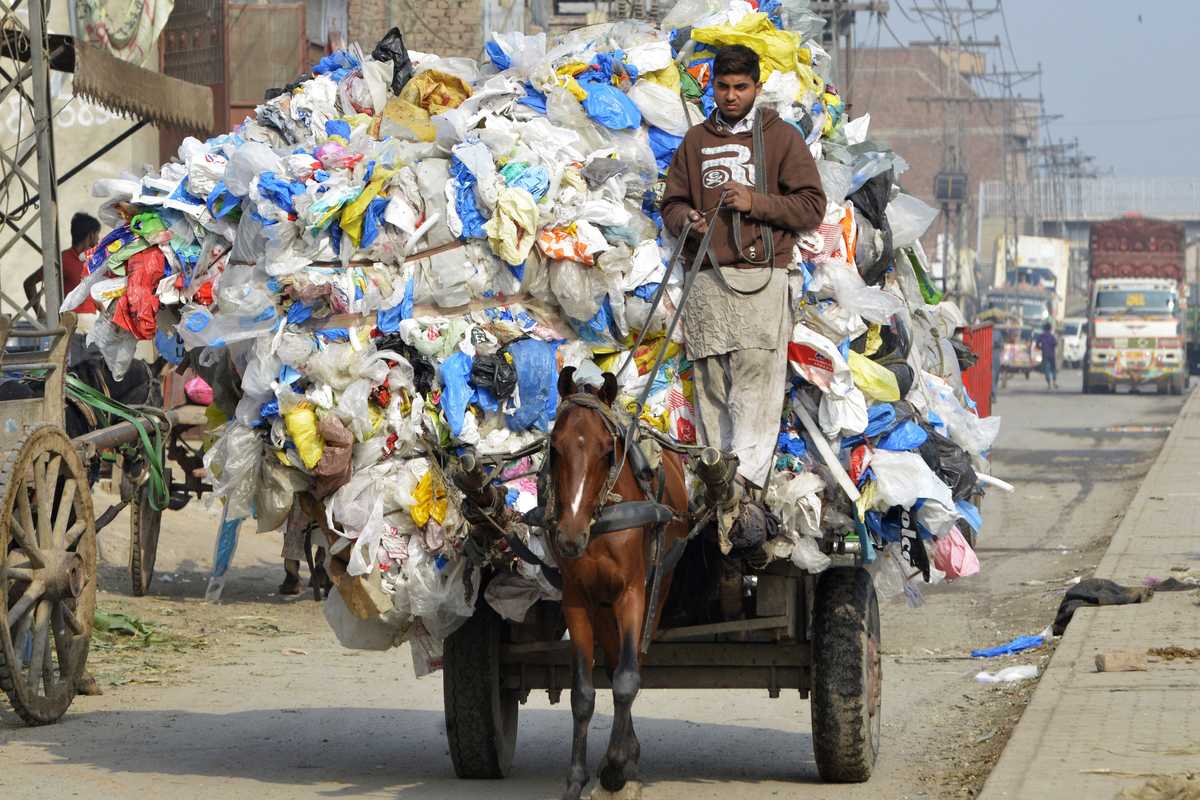Pakistan only recycles 4% to 9% of its plastic waste, report warns
Country produces 3.9 million tons of plastic waste yearly, but only a small fraction is recycled, officials say

Javed Hussain
Correspondent
I have almost 20 years of experience in print, radio, and TV media. I started my career with "Daily Jang" after which I got the opportunity to work in FM 103, Radio Pakistan, News One, Ab Tak News, Dawn News TV, Dunya News, 92 News and regional channels Rohi TV, Apna Channel and Sach TV where I worked and gained experience in different areas of all three mediums. My journey from reporting to news anchor in these organisations was excellent. Now, I am working as a correspondent with Nukta in Islamabad, where I get the opportunity of in-depth journalism and storytelling while I am now covering parliamentary affairs, politics, and technology.

A Pakistani boy carries waste plastic bags on a horse-driven cart in Lahore on December 11, 2018.
AFP
Pakistan generates about 3.9 million tons of plastic waste annually, but only 4% to 9% is recycled, according to a new government report presented at the Parliament House.
Most of the waste ends up in dumping sites, drains, sewage channels and municipal landfills. Officials say the growing volume of plastic pollution is contributing to clogged waterways, urban flooding and serious environmental degradation.
The Ministry of Climate Change and Environmental Coordination said plastic waste continues to spread despite regulatory efforts. Islamabad enforced Single-Use Plastic Regulations in 2023, but enforcement challenges persist.
Plastic bags and other banned items still reach the capital from neighboring provinces due to weak inter-provincial controls. Poor coordination among government agencies, manufacturers and consumers also hampers compliance, the ministry said.
Authorities cited a lack of affordable eco-friendly substitutes and unclear import policies for plastic polymers as barriers to progress. They warned these gaps are enabling the continued flow of cheap single-use plastics into the market.
The report detailed mounting damage to Pakistan’s farmlands, where plastic accumulates in soil and reduces agricultural productivity. Officials said plastic prevents crops from absorbing nutrients properly and makes sustainable farming more difficult.
Plastic waste also threatens Pakistan’s irrigation systems. Debris blocks canals, pipelines and rivers, limiting water flow and further straining the country’s already vulnerable water management network.
Livestock is increasingly consuming plastic and microplastics, harming organs and reducing the quality of meat, milk and eggs, according to the ministry. In humans, micro- and nanoplastics are associated with infertility, thyroid disorders, cancers, cardiovascular disease and neurological risks.
Tourism losses are another concern. Popular beaches, natural parks and recreation spots are suffering from littered plastic, which discourages visitors and damages local economies.
Formalizing informal recycling sector
To curb the crisis, officials said they plan to formalize Pakistan’s informal recycling sector. Waste collectors would be provided personal protective equipment and recognized for their role in recycling.
The Pakistan Environmental Protection Agency and the ministry are expanding public awareness drives in schools, universities and rural communities. Campaigns use media, billboards and seminars to encourage citizens to separate waste for recycling and reduce single-use plastics.
Authorities are also rolling out a three-bin waste segregation system for homes, commercial buildings and industries. The system separates organic, recyclable and non-recyclable waste, which officials said is in line with international standards.
Under an Extended Producer Responsibility framework, companies that manufacture or import single-use plastics are required to collect and recycle the waste they generate. Enforcement remains limited, but regulators say compliance will increase as infrastructure and monitoring improve.
Pakistan currently offers no subsidies or financial incentives for businesses making sustainable plastic alternatives. However, the government encourages participation through corporate social responsibility programs.
Situation could worsen
Experts warn the situation could rapidly worsen. Pakistan’s total plastic waste could exceed 6 million tons per year by 2050 if current trends continue, the report projected.
Pakistan generates around 8 kilograms of plastic waste per person each year — comparable to India and Bangladesh. But inefficient waste management systems are turning a relatively low per-capita output into a national environmental and public health emergency.
Environmental specialists said plastic pollution is no longer only a municipal challenge but a threat to daily life.
They urged immediate coordinated action by the government, industry and the public to prevent a full-scale ecological disaster.







Comments
See what people are discussing